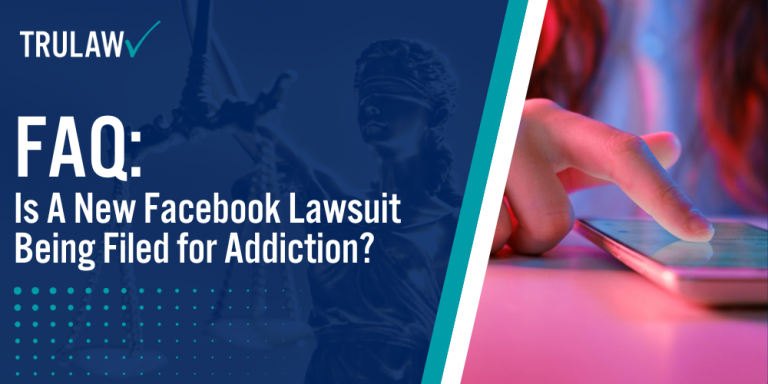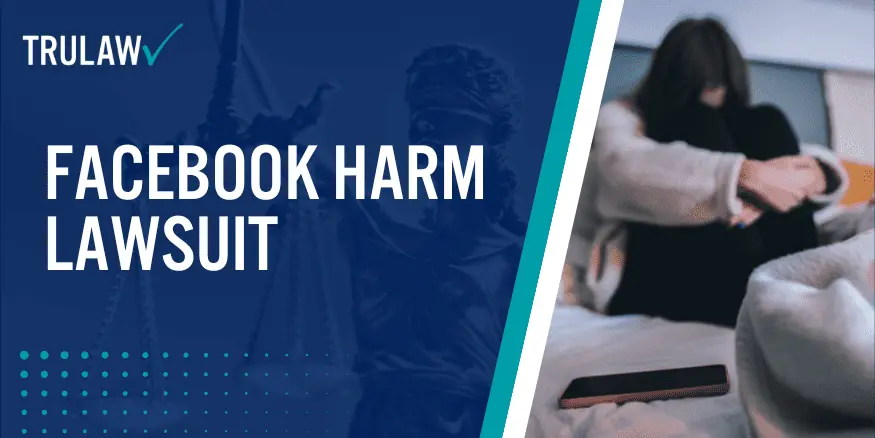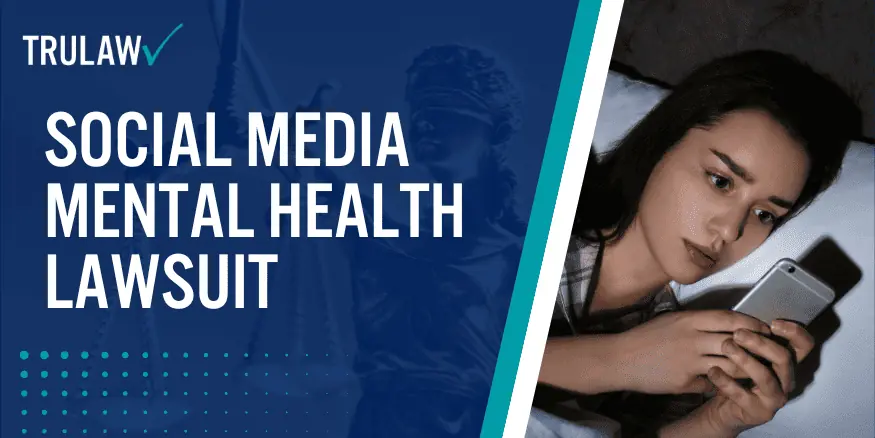FAQ: Can I Sue Facebook for Emotional Distress?
- Last Updated: July 9th, 2024

Attorney Jessie Paluch, founder of TruLaw, has over 25 years of experience as a personal injury and mass tort attorney, and previously worked as an international tax attorney at Deloitte. Jessie collaborates with attorneys nationwide — enabling her to share reliable, up-to-date legal information with our readers.
Legally Reviewed
This article has been written and reviewed for legal accuracy and clarity by the team of writers and legal experts at TruLaw and is as accurate as possible. This content should not be taken as legal advice from an attorney. If you would like to learn more about our owner and experienced injury lawyer, Jessie Paluch, you can do so here.
Fact-Checked
TruLaw does everything possible to make sure the information in this article is up to date and accurate. If you need specific legal advice about your case, contact us by using the chat on the bottom of this page. This article should not be taken as advice from an attorney.
Key takeaways:
- Proving emotional distress in a lawsuit against social media platforms requires demonstrating intentional or reckless conduct, extreme and outrageous behavior, causation, and evidence of actual suffering.
- Plaintiffs face challenges in suing social media companies for emotional distress, including Section 230 immunity, defining outrageous behavior, proving causation, and overcoming First Amendment protections.
- Gathering comprehensive evidence, such as medical records, expert testimony, and documentation of Facebook's role in distress, is crucial for a successful emotional distress claim against the platform.
Can I Sue Facebook for Emotional Distress? Let's Discuss.
On this page, we’ll discuss the question can I sue Facebook for emotional distress?, allegations made in the Facebook mental health lawsuit, explore the legal actions taken against Meta, and much more.
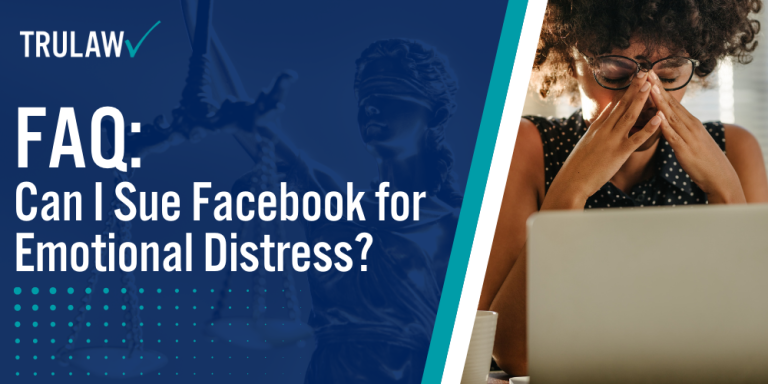
Intro to Emotional Distress Claims Against Facebook
Here are some key aspects to keep in mind:
- Facebook’s User Agreement: Users must understand that when they sign up for Facebook, they agree to the platform’s terms, which may significantly affect their ability to file a lawsuit.
- Legal Precedents: There have been instances where lawsuits against social media for mental health issues were brought to court. This sets a precedent for understanding the viability of such cases.
- Emotional Distress: To sue for emotional distress, one must typically prove that there was intentional or reckless conduct that was extreme and outrageous, leading to emotional suffering.
If you or a loved one has faced mental health issues believed to be linked to Facebook, you may be eligible to pursue compensation.
Contact Tru Law using the chat on this page to receive an instant case evaluation in the Facebook lawsuit today.
Table of Contents
Legal Basis for Emotional Distress Lawsuits
Understanding the foundational elements and potential challenges is imperative when investigating potential legal action for emotional distress.
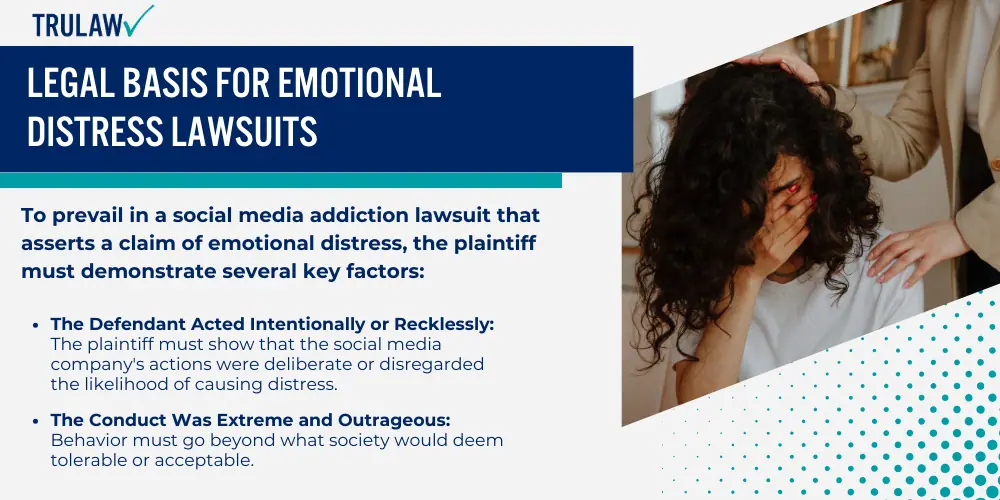
This part of the article focuses on what’s required to establish a case and the difficulties one might face, especially when intending to sue social media platforms.
Elements Required to Prove Emotional Distress
In the context of social media addiction lawsuits, emotional distress claims hinge on the ability to prove the social media platform’s culpability for causing harm.
To prevail in a social media addiction lawsuit that asserts a claim of emotional distress, the plaintiff must demonstrate several key factors:
- The Defendant Acted Intentionally or Recklessly: The plaintiff must show that the social media company’s actions were deliberate or disregarded the likelihood of causing distress.
- The Conduct Was Extreme and Outrageous: Behavior must go beyond what society would deem tolerable or acceptable.
- Causation of Emotional Distress: There must be a clear link between the actions of the defendant and the emotional distress suffered by the plaintiff.
- Evidence of Actual Suffering: The plaintiff needs to prove they experienced verifiable emotional distress, which may include anxiety, depression, and other psychological effects.
Challenges in Suing Social Media Platforms
Suing social media platforms for emotional distress presents unique challenges.
While users may feel significantly harmed by content or interactions on these platforms, legal hurdles can make it difficult to hold the companies themselves accountable.
When attempting to sue social media companies for emotional distress, plaintiffs face distinct hurdles:
- Section 230 of the Communications Decency Act: Provides social media platforms with immunity from liability for the content posted by their users.
- Defining the Scope of Outrageous Behaviour: It can be challenging for a plaintiff to prove that social media usage and the platform’s actions reach the level of extreme and outrageous conduct.
- Proving Causation: Establishing a direct link between the platform’s actions and the emotional distress claimed can be complex.
- First Amendment Protections: Social media online platforms often claim protection under free speech provisions, which can complicate legal arguments against their practices.
Examples of Emotional Distress Cases Against Facebook
The rise of social media lawsuits often includes claims against Facebook for circumstances leading to emotional distress.
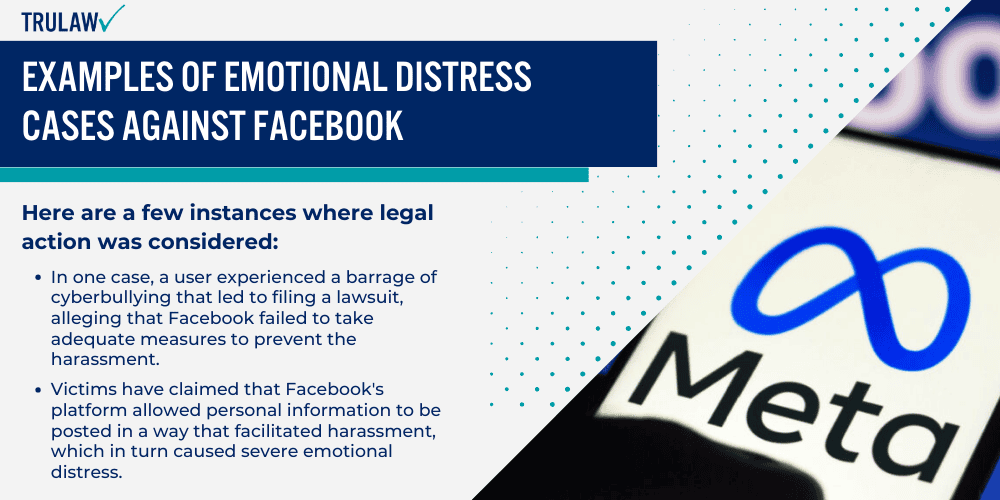
Navigating the legal landscape of these cases presents concrete examples of the challenges users may face.
Cyberbullying and Online Harassment
Facebook has been at the center of multiple cases where users experienced online harassment, leading to negative mental health impacts.
Here are a few instances where legal action was considered:
- In one case, a user experienced a barrage of cyberbullying that led to filing a lawsuit, alleging that Facebook failed to take adequate measures to prevent the harassment.
- Victims have claimed that Facebook’s platform allowed personal information to be posted in a way that facilitated harassment, which in turn caused severe emotional distress.
- There was an instance where a group page was created to target and bully an individual, which became the basis for legal action against Facebook and other social media platforms.
- Some Facebook mental health lawsuits have hinged on the argument that Facebook did not promptly respond to reports of harassment, contributing further to the victim’s emotional turmoil.
Privacy Violations and Data Breaches
Data breaches and privacy concerns on Facebook have also led to emotional distress claims.
Here’s how some of these cases have unfolded:
- A significant data breach exposed the personal information of millions of users, resulting in several users filing suits for the harmful effects on their mental well-being.
- There have been claims that Facebook’s data-sharing policies with third parties led to unwanted exposure and emotional stress for users.
- Lawsuits filed against Facebook have cited instances where private messages were allegedly leaked, leading to public embarrassment and emotional distress.
- Concerns over unauthorized data collection by social media apps have also led to lawsuits, with plaintiffs claiming violation of privacy and consequent mental anguish.
By understanding these examples, one gets a clearer image of the kinds of emotional distress cases users have brought against Facebook and other social media companies.
In each instance, the susceptibility of personal data in a digital environment comes to light, revealing the potential for trauma that social media users may experience.
Gathering Evidence for an Emotional Distress Claim
Initiating a lawsuit against Facebook for emotional distress necessitates the collection of comprehensive evidence.
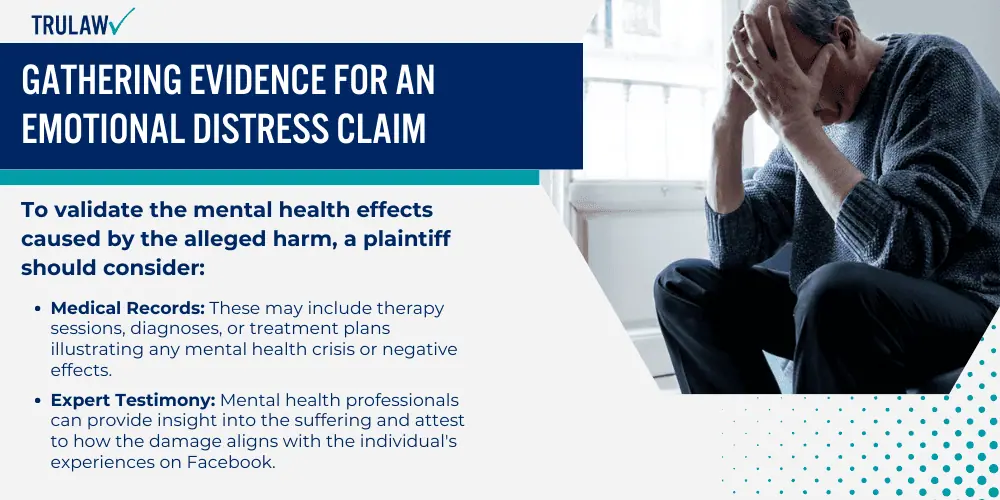
This evidence should substantiate and link the psychological impact directly to Facebook’s actions or negligence.
Documenting Emotional and Psychological Harm
Documenting emotional and psychological harm can be challenging, but collecting different types of evidence can help strengthen your case.
To validate the mental health effects caused by the alleged harm, a plaintiff should consider:
- Medical Records: These may include therapy sessions, diagnoses, or treatment plans illustrating any mental health crisis or negative effects.
- Expert Testimony: Mental health professionals can provide insight into the suffering and attest to how the damage aligns with the individual’s experiences on Facebook.
- Personal Documentation: Keeping a detailed diary or journal that chronicles the intensity and frequency of suffering emotional damage can be persuasive.
- Witness Statements: Statements from friends, family, or colleagues who have observed changes in the plaintiff’s behavior or emotional state can corroborate the extent of harm.
Establishing Facebook’s Role in the Distress
One must demonstrate how Facebook is culpable for the distress for a claim to stand.
Consider the following:
- Internal Research: If available and accessible, Facebook’s studies can sometimes reveal an awareness of potential harm associated with platform use.
- Patterns of Behavior: Evidence of repeated exposure to harmful content on Facebook and the platform’s response to complaints may show a link.
- Policies and Practices: This section analyzes whether Facebook’s policies may contribute to harm despite its public commitment to user mental health.
- Comparative Experiences: Accounts from other users who have suffered similarly can suggest a broader issue with the platform’s effect on mental health.
By meticulously assembling evidence that highlights the direct impact of Facebook on one’s mental health, the pathway to a successful lawsuit becomes more tangible.
Filing an Emotional Distress Lawsuit Against Facebook
Filing a lawsuit against a large social media platform like Facebook requires a well-prepared legal strategy and an understanding of the litigation process’s steps.
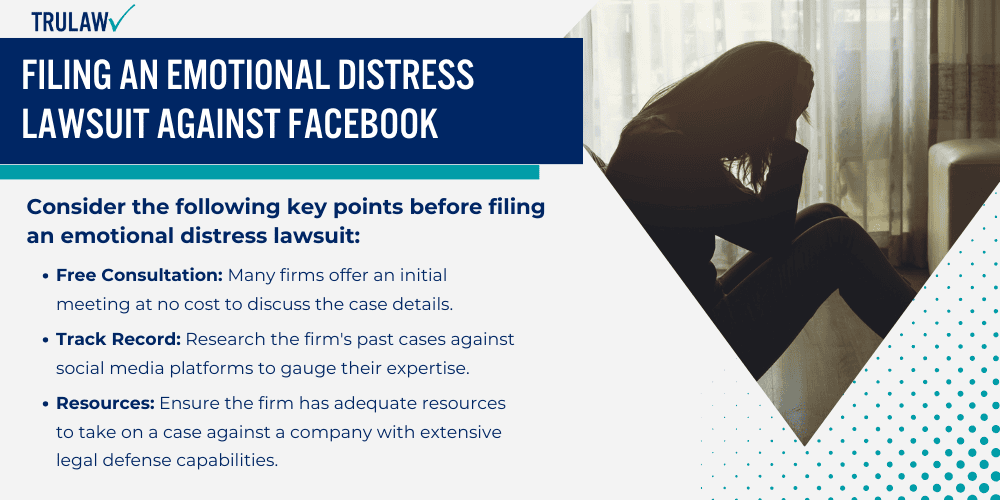
Choosing the Right Legal Representation
The first step in pursuing a legal claim for emotional distress against Facebook is selecting an attorney with experience in social media law.
Consider the following:
- Free Consultation: Many firms offer an initial meeting at no cost to discuss the case details.
- Track Record: Research the firm’s past cases against social media platforms to gauge their expertise.
- Resources: Ensure the firm has adequate resources to take on a case against a company with extensive legal defense capabilities.
- Strategy: The attorney should be able to outline a clear plan for obtaining legal remedies for the emotional distress caused.
Understanding the Litigation Process
The legal process involved in suing Facebook can be lengthy and requires patience.
Key stages typically include:
- Filing: A complaint must be officially filed in a court of law, which details the nature of the emotional distress claims.
- Discovery: Both sides exchange relevant information, which may include Facebook files about the case.
- Motion Practice: Before trial, parties may file motions to compel actions or dismiss parts of the case.
- Trial: If the case proceeds to trial, it will be heard before a judge or jury to decide on the legal remedies.
TruLaw: #1 Law Firm for Suing Facebook for Emotional Distress
When pursuing a lawsuit against a social media giant like Facebook for emotional distress, TruLaw stands out because of its specialized experience in such cases.
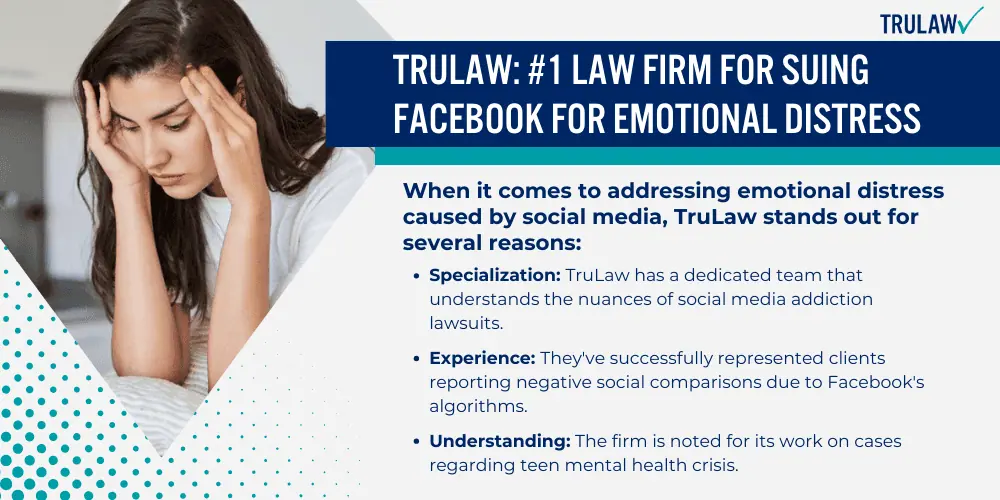
Why Choose TruLaw for Your Emotional Distress Claim
TruLaw is widely recognized for its expertise in handling cases related to emotional distress caused by social media platforms.
They take a focused approach to each case, centered around the unique challenges faced by individuals who have experienced harm due to online environments.
When it comes to addressing emotional distress caused by social media, TruLaw stands out for several reasons:
- Specialization: TruLaw has a dedicated team that understands the nuances of social media addiction lawsuits.
- Experience: They’ve successfully represented clients reporting negative social comparisons due to Facebook’s algorithms.
- Understanding: The firm is noted for its work on cases regarding teen mental health crisis.
- Support: TruLaw offers resources and support for those dealing with various mental health problems related to social media use, particularly teen girls.
Free Case Evaluation: Contact TruLaw Today
Contacting TruLaw for a case evaluation is a straightforward process designed for plaintiffs’ ease.
- Accessibility: TruLaw’s free evaluations ensure financial concerns don’t hinder initial consultations.
- Confidentiality: Every evaluation maintains the highest degree of privacy and discretion.
- Responsiveness: The firm commits to swiftly assessing the merits of potential claims.
- Guidance: Clients receive clear and actionable feedback on proceeding with their emotional distress claims against Facebook.
Frequently Asked Questions
-
What qualifies as legally actionable emotional distress?
Legally actionable emotional distress generally includes suffering that surpasses typical discomfort, stress, or anguish.
The distress experienced must be significant, provable, and directly linked to a defendant’s conduct.
-
What are the precedents for litigation against social media companies for emotional distress?
While precedents specifically targeting social media companies for emotional distress are evolving, courts have considered the context, severity, and intentionality of online interactions concerning existing legal frameworks on harassment and emotional distress.
-
Is pursuing legal action for defamation or slander on social media platforms possible?
Yes, legal action for defamation or slander can be pursued if false statements on social media damage an individual’s reputation.
The plaintiff must demonstrate that the statements were made publicly, false, and caused harm.
-
How does one prove emotional distress caused by an online entity?
Proving emotional distress involves demonstrating that the distress was the direct result of the online entity’s actions.
Evidence might include documentation of interactions, testimony from mental health professionals, and a clear link between the content and the distress.
-
What are the general outcomes of cases where individuals have sued social media platforms?
The outcomes can vary widely depending on the case’s specifics.
Still, challenges include establishing platform liability, jurisdictional issues, and applying Section 230 of the Communications Decency Act, which often shields platforms from responsibility for user-generated content.
-
Under what circumstances can a social media page or account be held liable for causing emotional distress?
A social media page or account may be held liable if it intentionally harasses or targets an individual leading to documented emotional distress, provides a social media site for others to do so, or fails to remove threatening or abusive content that it has been made aware of.

Experienced Attorney & Legal SaaS CEO
With over 25 years of legal experience, Jessie is an Illinois lawyer, a CPA, and a mother of three. She spent the first decade of her career working as an international tax attorney at Deloitte.
In 2009, Jessie co-founded her own law firm with her husband – which has scaled to over 30 employees since its conception.
In 2016, Jessie founded TruLaw, which allows her to collaborate with attorneys and legal experts across the United States on a daily basis. This hypervaluable network of experts is what enables her to share reliable legal information with her readers!
You can learn more about the Social Media Harm Lawsuits by visiting any of our pages listed below:
Here, at TruLaw, we’re committed to helping victims get the justice they deserve.
Alongside our partner law firms, we have successfully collected over $3 Billion in verdicts and settlements on behalf of injured individuals.
Would you like our help?
At TruLaw, we fiercely combat corporations that endanger individuals’ well-being. If you’ve suffered injuries and believe these well-funded entities should be held accountable, we’re here for you.
With TruLaw, you gain access to successful and seasoned lawyers who maximize your chances of success. Our lawyers invest in you—they do not receive a dime until your lawsuit reaches a successful resolution!
Do you believe you’re entitled to compensation?
Use our Instant Case Evaluator to find out in as little as 60 seconds!
Camp Lejeune’s water contamination issue spanned several decades starting in the 1950s. Exposure to these chemicals has been linked to various serious health issues, including cancer, organ diseases, and death.
Research is increasingly suggesting a link between the use of Tylenol during pregnancy and the development of neurodevelopmental disorders, such as autism and ADHD, in infants.
Legal action is being taken against manufacturers of Aqueous Film-Forming Foam (AFFF), a chemical used in fighting fires. The plaintiffs allege that exposure to the foam caused health issues such as cancer, organ damage, and birth and fertility issues.
Here, at TruLaw, we’re committed to helping victims get the justice they deserve.
Alongside our partner law firms, we have successfully collected over $3 Billion in verdicts and settlements on behalf of injured individuals.
Would you like our help?
